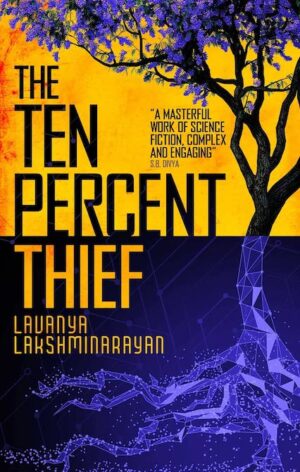Meritocracy is our modern religion. It’s a just-so story for the just-world fallacy. We want to believe that wealthy, powerful people deserve all the power they wield over the rest of us, because otherwise we’re gazing up at an unfairness that feels crushing. And the notion of upward mobility, that talented people can pulling themselves up by their bootstraps, is hardwired into our collective consciousness.
Lately I’ve been thinking a lot about the movie Trading Places, though I haven’t had time to rewatch it and see how well it holds up. The film’s central notion—that an unhoused con artist could do just as good a job as a titan of finance—remains as subversive as it was forty years ago, and this may actually be an example of that oft-cited mythical beast: a classic comedy that could not get made today. (Seriously, can you imagine a comedy today where a person pulled at random off the street turns out to be as good at running a giant tech company as its massively paid CEO? I doubt you could raise the funding.)
But three recent science fiction stories poke at the myth of meritocracy, and each of them reveals something different about why this is such a seductive fantasy.
3% (Três Por Cento)
This Brazilian science fiction show is on Netflix, and the first season in particular remains a must-watch. In the future, the vast majority of people live in shantytowns or slums, cobbling together scraps of technology and scavenging for food. But the elite, the gifted three percent, live on a special high-tech island called the Offshore, where there’s no scarcity and everything is basically perfect. Each year, everyone who has just turned eighteen is given the opportunity to compete for a place in the Offshore.
The first season of 3% tells the story of one of these testing periods, following a group of young people who try out for a membership in the elite. Early on, we see one of the applicants cheat on a test, stealing from another contestant—and when this is brought to the attention of the administrators, they still let the cheater advance to the next level. Later, when a test involving imprisoning the contestants in their dorm doesn’t get intense enough to eliminate people, the organizers take steps to ratchet up the pressure until the contestants start brutalizing each other, eventually killing one innocent person. Some of the tests do seem to look for creativity and problem-solving, but most of them are fucked-up mind games, and they continually reward people who are willing to be ruthless and evil instead of people who might contribute positively to a society.
(And as this excellent Tumblr post points out, in later seasons, some rebels against the Offshore try to create their own utopian community. They end up having to devise their own tests to assign membership in their own utopia, but eventually learn that any test designed by humans will be flawed and biased.)
Meanwhile, everyone who lives in the Offshore has been sterilized so they can’t have kids of their own, forcing them to keep importing the “best and brightest” from outside. But one of the competitors in season one, a guy named Marco Álvares, comes from a privileged family whose members have always made it into the Offshore, and he’s been given an education and various other advantages designed to help him get ahead. When we finally see the home where Marco grew up, it’s terribly sad: he’s spent his whole childhood living alone with a maid who’s devoted to him, because all his family are in the Offshore, where there are no children.
The Ten Percent Thief by Lavanya Lakshminarayan

This novel (published in India as Analog/Virtual) tells the story of an underground rebellion against another elite, the Virtuals who live in Apex City, lording over the slums containing the majority of humanity, referred to as Analogs. Yep, this is something of a common trope in stories which comment on inequality, including the movie Elysium. What’s sets Ten Percent Thief apart is its mosaic storytelling—pretty much every chapter is from a different POV, and the same POVs don’t really recur—but also its snarky, satirical tone.
I’m a big fan of the scenes in Ten Percent Thief where Virtual kids from Apex City are taken on a sanitized guided tour of the wreckage on the ground where everyone else lives—a kind of poverty tourism that feels all too familiar in today’s world. (As this review puts it, the Analogs are viewed behind glass, like zoo animals.)
But one thing that sets Ten Percent Thief apart in my mind is the incisive ways that Lakshminarayan shows how much meritocracy is a matter of social conformity. The most vivid sections involve people who are trying to move up into the upper echelon of Apex City, by changing everything about themselves. The dominant Bell Corp. controls its people via brain implants, and any failure is punished by banishment to the ground. And here’s where the satire gets more acute: one man, who secretly used to be part of the lowest class of Analogs, gets a program installed in his brain that prevents him from thinking of any associations with his impoverished past that might get in the way of his advancement, while slowly changing all of his behaviors and tastes to fit in with the expectations of the elite—he can’t like the wrong music or entertainments, or he’ll be kicked out of the upper echelon. Another woman, whose productivity is slipping, desperately attempts to meet the demands of a program designed to ensure every moment is maximally efficient. A second woman, Aditi, has an implant that pushes her to change her life, including dumping her actually quite nice boyfriend, so she’ll fit in better with the elite.
Lakshminarayan does a wonderful job of showing the extent to which meritocracy is not about intelligence or accomplishment, but rather about showing the proper signifiers and the correct behaviors. It’s just another mechanism of social control.
Escape Velocity by Victor Manibo

The rich and shameless gather on a luxury space station for the class reunion of a fancy boarding school. A lot of this book reads like a bit of a soap opera, as one ultra-powerful tycoon secretly pays another man to sexually humiliate him, and other characters dig into each other’s closet skeletons. Ava Khan, a trans woman, searches for the truth about the murder of her brother 25 years ago. And meanwhile we see the staff of the luxury space station, mostly Filipinos, observing the decadence of these rich people while making their own secret plans for liberation.
Once again, this is a future where present-day inequality has become even starker, and the rich live in a completely different world than everyone else. But like the other two stories I mentioned, Escape Velocity offers a unique insight on how the elite sausage is made. All of its characters are competing for a spot on a colony ship going to Mars, where humanity will start over now that we’re done trashing the Earth. Everybody obsesses over how many MERIT Points they have, in a system that chooses Mars colonists in a supposedly egalitarian manner based solely on ability and experience.
Except… one of the main ways you get MERIT Points is by doing spacewalks and spending time in space habitats, which are experiences only available the most privileged. And the more we learn about the MERIT Points system, the more it appears to be riddled with loopholes and cronyism. Ava’s father designed this system after her brother was murdered, and his desire to root out undesirables is at the heart of its structure. At one point, Ava reflects that the system was “designed to favor certain people,” and that it’s not so much “Mars for All” as “Mars for the Best of Us,” according to certain narrow criteria. Everybody knows the MERIT system is hopelessly corrupt and broken, but nobody has an incentive to fix it—and the whole notion of saving a handful of humans while consigning Earth to destruction is intrinsically monstrous.
We often think of dystopia in simplistic terms: there’s a faceless entity watching us, nobody has individuality, and a privileged few rule over everyone else. But to the extent that these three stories are dystopias, each of them contains subtle, sly nuances that complicate the picture and reveal different aspects of how oppressive systems function. Understanding the ways that supposedly-fair systems have cheat codes built into them from the ground up is a key part of learning to resist the encroachment of dystopia in our own world.
This article was originally published at Happy Dancing, Charlie Jane Anders’ newsletter, available on Buttondown.










